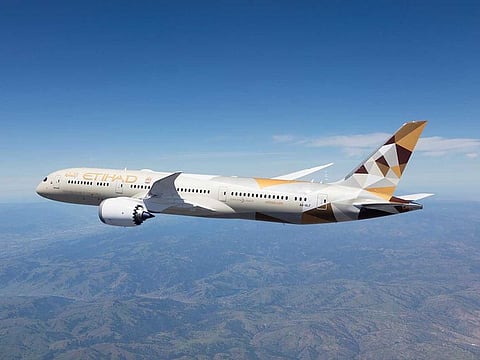Etihad CEO reveals game plan for 27 new destination launches by 2025-end
Airline has already launched flights to Al Alamein, Atlanta, Prague, Warsaw this year

Abu Dhabi: The UAE’s national carrier is set to launch 27 new destinations by the end of 2025, a monumental undertaking that underscores its rapid growth. This aggressive push, which has seen the airline more than double its annual passenger numbers from 10 million to over 20 million in just two and a half years, is a testament to meticulous planning, agile execution, discipline, and resilience in the face of global shifts, according to CEO Antónoaldo Neves.
"We decided about two and a half years ago that we would have a very, let us say, diligent approach about, about growth. And the number one point that we have made clear is that we would only be successful if we were disciplined in executing that plan,” he said.
He emphasised that this strategy, strongly supported by their shareholder, is about executing plans rigorously while also being flexible enough to adapt quickly, much like a footballer, “Cristiano Ronaldo. The guy’s very disciplined. But when he's playing, he’s very agile.”
Flying high
The last 12 months have seen Etihad flying high, breaking records and achieving new milestones at an astonishing rate, delivering a record Q1 with a profit of Dh685 million and the highest-ever customer satisfaction scores. “We are the only airline in the region growing at this pace, and we have no intention of slowing down. 2025 is proving to be our biggest year yet."
He explained that while some recent launches, such as Atlanta, Almaty, Prague, Sochi, and Warsaw, are already operational, the remaining new routes will be progressively introduced.
“So, for instance, these seven new destinations that were just announced were in our 2026 and 2027 plans. But because supply and demand were, let’s say, unbalanced, when one of our competitors decided to leave, we said, 'Look, we need to take the opportunity so that supply and demand are balanced again.,” explained Neves.
“So the way we approach it is with a lot of agility, and we still have destinations that are going to start. I'm not going to deny it’s a lot of work,” he added.
New aircraft
That said, the launches are hinged on the timely delivery of new aircraft from OEMs and other sources – an issue that has plagued the global aviation industry since 2020. However, Etihad has gained a reputation for acquiring aircraft by any means necessary. It is set to receive 18 new aircraft this year.
“We still have 16 coming, because we have two that are not flying yet (two aircraft have been accepted, but are yet to fly). They have been delivered, but they will be flying in the next three to four days.” Many of these aircraft will be deployed to new destinations, including the Airbus A321LR – a first for Etihad.
Beyond expanding to new destinations, two-thirds of the additional capacity is dedicated to bolstering existing popular routes, bringing the total to over 40 destinations now enjoying double-daily flights—a sharp increase from just 14 destinations a year and a half ago.
Geopolitics and competition
While recent geopolitical tensions caused a "moderate" impact on bookings, Neves confirmed that Etihad has already recovered lost bookings for July and August.
Despite geopolitical complexities, Neves remains highly optimistic about sustained consumer demand, particularly within the dynamic Middle East. While “there is space for everyone,” he said, only the most efficient and customer-centric airlines will thrive, in response to a question about the new Saudi budget carrier to be operating out of Dammam. “It is very hard to compete in this market. We have a beautiful thing in this region, there’s a lot of efficiency,” he explained.
He asserted that for any airline to succeed, particularly new entrants, they must be highly efficient and, crucially, offer great customer service. Neves pointed out that regional low-cost carriers like IndiGo and Air Arabia thrive because they understand the local customer’s demand for good service, even on budget flights. He said airlines must keep costs low but never compromise on service quality to win over the discerning regional traveller.
‘In a sweet spot’
Neves acknowledged industry-wide supply chain challenges but confidently stated that Etihad is in a "sweet spot" due to a combination of long-standing orders and the agile acquisition of available aircraft from the market.
Looking to the future, Etihad’s commitment to the guest experience is underscored by a substantial $1 billion retrofit programme for its existing fleet. With seat selections finalised and trim and finish defined, this massive investment, expected to commence full implementation between late 2026 and early 2027.
Sign up for the Daily Briefing
Get the latest news and updates straight to your inbox


